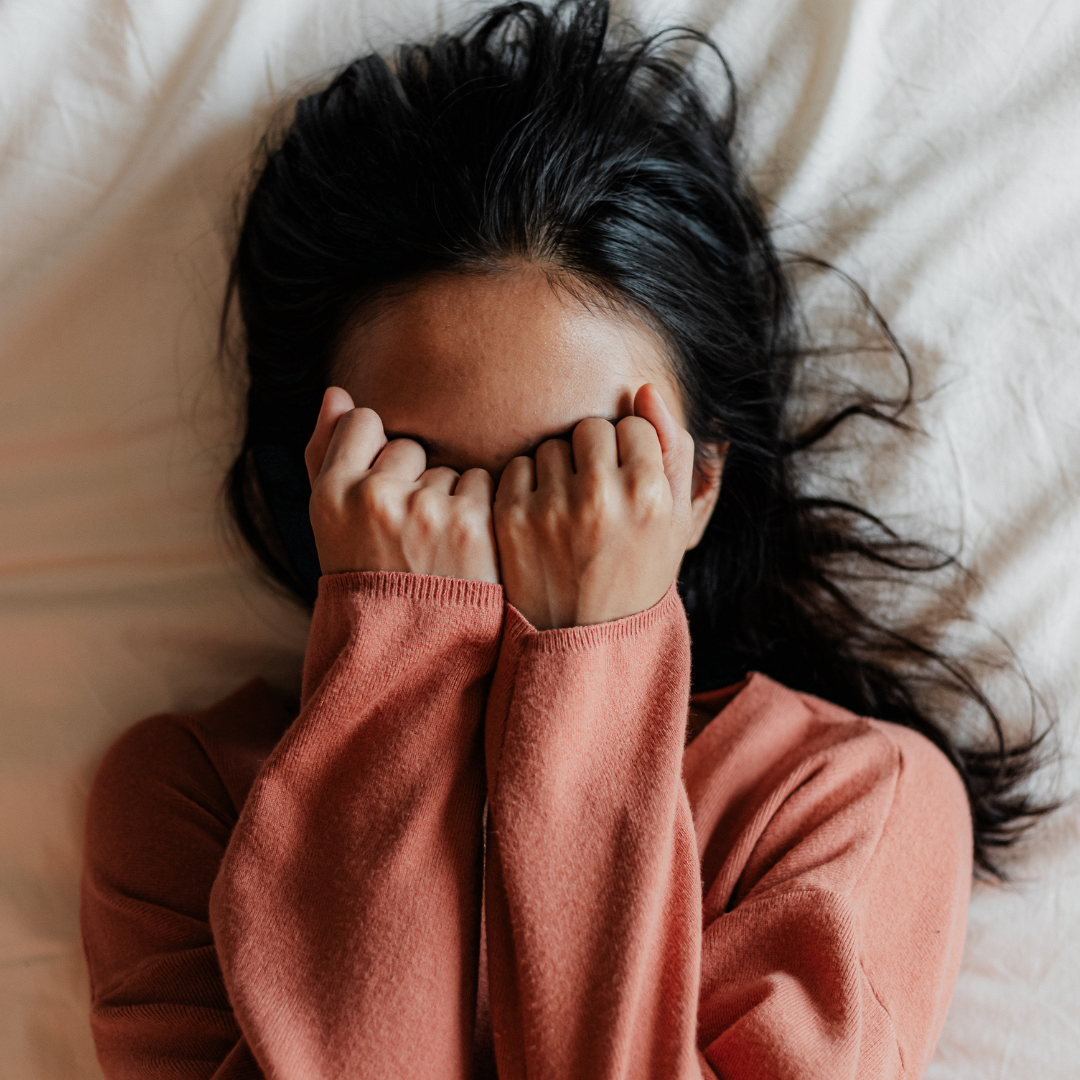
How to Sleep with Snoring
Sleeping with a snorer is a daunting challenge. No matter how much we care about someone, that sanity-shattering racket can be a deal-breaker. However saintly you may be, the constant sleep loss will eventually cause resentment, loss of intimacy—maybe even separate bedrooms. I’m guessing that isn’t what either of you want, so in the interest of maintaining closeness, let’s look at how to sleep with snoring and still get quality sleep.
Here’s what we’ll cover:
- How to sleep with snoring, for the "Snoree"(that's you)
- Why your Snorer snores
- How to deal with snoring, for the Snorer (better sleep for them too)
It’s not just driving you mad and preventing Your sleep—your Snorer isn’t getting quality sleep either

Why your snorer snores will help you understand the root of the problem… and that this person, the one you care deeply for, is also getting lousy sleep. Their incessant snoring isn’t just annoying you—it’s also preventing your partner from getting the quality sleep they need. In some cases, it may even indicate a serious underlying health issue. But let’s start with the reason you’re here…
How to Sleep with Snoring—for the "Snoree"
The web is full of how-to-sleep-with-snoring advice. From earplugs to sound machines, to noise cancelling headphones… to poking, nudging, or turning your partner over (ensuring you’re both awake and cranky.) And of course, there’s the old tennis ball trick. Or how about this, “focus on something else” (yeah, right.) You can ignore most of it. Unfortunately, you cannot ignore the snoring.
If you’re dealing with a world-class snorer—who can easily reach an 80-decibel roar—none of these will save your sleep. You probably already know this.
Left with these unsatisfactory measures, you’ve likely vacated the bed… or sentenced your partner to the couch. Better than smothering them with a pillow, but… have you solved the problem or changed it out for a new one?

Poking, nudging, or turning your partner over just ensures you’re both awake and cranky.
The Sleep Divorce
A sleep divorce may not cost you financially, but it will cost you. While these elective sleep separations are fairly common, our customers tell us that sleeping apart made them feel sad… sometimes guilty. The offending partners experience guilt as well. These negative emotions, combined with the exhaustive lack-of-sleep effects, tear at the fabric of relationships.
According to statistics, snoring has contributed to the demise of 2-out of-5 American adult relationships. And, more than half the couples who sleep together regularly say they would prefer to sleep apart because they can’t deal with their partner’s sleeping habits.
Couples who sleep next to each other get more REM sleep—this can reduce stress and improve relationships

Why sleeping together is better
Astudy by Dr. Henning Johannes Drews of the Center for Integrative Psychiatry (ZIP), Germany concludedthat couples who sleep next to one another have increased REM sleep, and have less disrupted sleep, than couples who sleep apart. They also proposed that the combination of sleeping together and experiencing this rejuvenating sleep, reduces emotional stress and improves relationships.
According to Dr. Drews, there may be additional health benefits; he states, “sleeping with a partner might actually give you an extra boost regarding your mental health, your memory, and creative problem-solving skills.”
From our experience, most couples don’t want to sleep apart. With all the stories out there claiming “We have separate rooms now and I’m ok with that,” I’m happy to say we receive many “Thanks for saving my relationship!” stories.
They often tell us, trying to sleep peacefully with their partner was a long, arduous road. Many tried all the options above, and then some. Fortunately, they stuck with it until they found something that worked. Now they’re able to sleep snore-free with the person they love.

What's the secret? Mute the snoring!
Startling, interruptive noises like snoring require a serious noise solution. The louder the snore, the harder it is to silence. It’s not enough to muffle it with earplugs—or switch on a sound machine that plays in concert with the snoring. And the noise cancelling headphones? Noise cancelling technology doesn’t cancel out the sound completely, so you’ll still hear the snoring—just at a lower volume.
If you really want to know how to sleep with snoring, the answer is to completely block out the snoring sound. This way you’re able to fall asleep, and you won’t be awakened later by any sudden snore bursts.

Mute the Snoring with noise masking—it replaces the sound you don’t want to hear with a more pleasant sound.
Noise Masking
Noise masking technology is different from noise cancelling technology—and more effective for completely blocking out noise. It uses one sound to mask (block out) another sound. This masking sound might be colored noise tones, nature sounds, or possibly music. The more pleasant sound emitted by the device, masks out the sound you don’t want to hear and delivers the more pleasant sound directly into your ear via an earbud.
Truly effective noise masking combines both active and passive noise masking into a cohesive solution. The active part is the sound being delivered into the ear. The passive component is the earbud tip which provides an element of comfort between the earbud and the ear canal, while effectively preventing any additional sounds from entering the ear. The sound is completely blocked—now you can sleep with snoring—peacefully, all night long.
Pink Noise
SoundOff earbuds use this dual noise masking process to deliver a soothing pink noise that completely masks out sleep-disturbing noises. This is not just any canned pink noise. Our SoundOff Sleep Sound, is a custom-shaped pink noise, developed by a PhD in psychoacoustics—using tones specifically designed to block out snoring.
Pink noise relaxes the brain and promotes deeper, more rejuvenating sleep.

Studies show pink noise relaxes the brain and users say these earbuds actually lull them to sleep. We’ve even been told they would continue to use SoundOff to fall asleep if their snorer just suddenly stopped snoring. Now that you know how to sleep with snoring, let’s look at…
Why your snorer snores—and tips to help them deal with it
There are many, varied reasons that could explain why your snorer snores. Discovering the exact reason may well require a professional diagnosis and possible treatment. While some causes can be managed or even minimized with certain lifestyle changes, others are more serious and require professional assessment and guidance.
From aging, to diet, alcohol consumption, and sleep apnea, we’ll look at potential causes that may trigger or worsen snoring. We also have some helpful tips to assist your snorer in learning how to sleep with snoring (theirs.) Ideally, this will help them reduce their snoring, and result in better sleep for you both—so have your snorer take a look as well…
What is snoring?
The snoring sound is produced when your airway is partially blocked and begins to vibrate. This takes place when your soft palate (muscles in the roof of your mouth,) tongue and throat relax during the transition from a light sleep into deeper sleep.
The force of the restricted airflow is greater, in proportion to the degree of narrowing in the airway—which increases the tissue vibration—and thus the volume of the snoring. Here are some conditions that may restrict the airway, and cause that infernal snoring you’re trying to escape…
Primary causes of Snoring
Aging
As we know, aging brings a number of sleep changes—one of these changes may be an increase in snoring. This is because the tongue, and the muscles around the airway, weaken with age. When functioning optimally, the muscles and tissue of the soft palate are mobile and flexible so that they separate the mouth from the throat—for the primary purpose of keeping food out of the respiratory tract when one swallows.
Tip: Mouth and throat exercises known as Myofunctional Therapy, may help reduce snoring caused by aging and weakened muscles.
Alcohol
Alcohol relaxes your throat muscles. This inhibits your body’s natural defense against airway obstruction. Also, alcohol’s sedative effects wear off, and actually cause you to start waking up midway through your sleep cycle.
Tip: It’s good practice—for snorers, and all the rest of us—to cut off alcohol consumption at least four hours before bed to lessen its ability to interrupt sleep.

Colds, flu, and allergies block one’s ability to breathe through the nostrils—creating irregular pressure in the nasal passages
Allergies/Respiratory Issues
Colds, flu, and allergies are the most common causes of nasal snoring. They block one’s ability to breathe through the nostrils which creates irregular pressure in nasal passages. This causes the soft tissue in the nostrils to flop around and forces mouth breathing which leads to snoring.
Nasal sprays are sometimes helpful in this case, as are nasal strips. The strips pull on the sides of the nose to widen the nasal passage and improve the airflow through the nose. You can also try using a humidifier while you sleep.
Tip: Practice deep breathing on a regular basis, while focusing on relaxing the nostrils, to help improve your airflow. Smoking causes nasal congestion and is a major cause of snoring—consider giving it up for better sleep.
Anatomy of the Mouth & Sinuses
If you have a long, thick, soft palate, it may cause your airway to become narrow. This can also happen if you are overweight and have extra tissue in the back of your throat. Another cause of snoring might be a piece of elongated tissue hanging from the palate—this both blocks airflow and causes increased vibration.
Having a severe overbite (protrusion of upper teeth over the lower teeth) will cause snoring as well, as it pushes the jaw backwards and pinches the airway. A structural defect in the airway, such as a deviated septum, is also a possibility. Likewise, jaw misalignment resulting from injury.
Tip: Focus on taking off any extra pounds. Seek professional advice to help correct any physical or dental problems that may be triggering the snoring.
Back Sleeper
It has been observed that people who sleep on their backs snore the loudest and most frequently—this is thought to be due to gravity’s narrowing effect on the throat/airway. One way to counteract this is by sleeping on one side with your chin pointed downward a bit. This will cause that gravity to pull your tongue forward, which prevents the snoring.
There are special pillows and wedges available for the comfort of side sleepers. There’s even a side-sleeper backpack that will keep you from turning over, so that you remain in a side-sleeping position through the night.
Tip: If you practice moving the tip of your tongue around during the day, (slowly slide it back and forth on the roof of your mouth 5-10 times,) the muscles will become stronger and make you less likely to snore.
People who sleep on their backs snore the loudest & most frequently—try switching to your side

DNA
Sometimes snoring runs in the family. Heredity can indicate a person’s potential for snoring as well as a tendency toward sleep apnea.Knowing your family history is a great advantage. When you know you’re likely to be predisposed to any type of health condition, you have a head start on keeping it in check.
Give your body the extra attention it needs. Practice a healthy lifestyle and take preventive measures by controlling your diet, weight and stress. Be sure to incorporate daily moderate exercise.
Gaining Weight
Obesity is a primary cause of snoring, particularly when there’s fat around the neck, which compresses the upper airway when you lie down. Abdominal fat also restricts your airflow—by pushing up your diaphragm and compressing your ribcage—which puts pressure on your lungs. Worse, the poor sleep you get as a result of the snoring will only slow down your metabolism and add to the weight gain.
According to WebMD, losing just 5-8 of those excess pounds can help decrease, and in some cases eliminate, the snoring. Once you’re sleeping better, you’re likely to see more of those pounds fall off!
Tip: A light, brisk walk in the evenings is easy and effective. Boost those results by practicing exercises that open up the neck and lungs to facilitate better breathing.

Losing just 5-8 of those excess pounds can help decrease—or sometimes eliminate—snoring
Image Credit: Total Shape
Gender
Men are more prone to snore, although plenty of women do as well. Their larger upper airways and lower hanging larynxes tend to create a large space in the back of the throat which amplifies the sound of snoring. Also, men mostly carry their weight in their chest, neck and thorax—these thicker necks have more soft tissue and fat deposits which place more weight on the airways when they lie down.
Some women may have larger airways and fatter necks than their male counterparts, but women are at an overall lower risk for sleep apnea. This statistic changes significantly with the onset of menopause, due to decreased estrogen and progesterone levels which provide a degree of protection against snoring and sleep apnea.
Medications/Sedatives
The issue with medications is two-fold. Number 1, even though sedatives put you to sleep, by relaxing your throat muscles, the snoring is made worse. Secondly, any medications that cause weight gain, increase snoring and sleep apnea risk. Here are some that have known weight-gain side effects:
- Any of the tricyclic antidepressants (TCAs) are known to stimulate appetite. SSRIs (selective serotonin reuptake inhibitors) like Paxil, Prozac, Lexapro, and Zoloft, can cause a weight gain of 10 pounds or more.
- One study reported 44% of women and 24% of men gained an average of 11 lbs over the course of one year from a common mood stabilizer used to treat bipolar disorder, migraines and seizures.
- Significant weight-gain of 7% or more in original body weight has been reported in up to 30% of patients using anti-psychotics. These drugs can also cause insulin resistance and potentially, diabetes. One study found that Zyprexa taken for only 2 weeks increased the subject group’s food intake by 17%.
- 70% of people on chronic steroid regimens such as Prednisone report significant weight gain.
- Patients on antihistamines such as Allegra and Zyrtec are considered 55% more likely to be overweight
- Findings on Insulin show it actually promotes weight gain
- Beta-blockers such as Metoprolol and Propranolol are also associated with significant weight increase.
These are just facts—we’re not advocating giving up any of your meds. We do, however, encourage you to offset the potential weight-gain effects by practicing a healthy lifestyle and developing more sleep-promoting habits.
Poor Diet
Consuming a wholesome diet that maintains healthy weight and promotes good sleep is essential to getting a good night’s sleep. In addition, these 8 foods are believed to help alleviate snoring—make sure to eat them regularly:
- Fish—has omega 3 fatty acids to combat the production of phlegm which can block nasal passages.
- Garlic—has anti-inflammatory properties and staves off respiratory infection
- Honey—opens nasal passages to allow air to pass through freely
- Onions—help keep the nose and throat clear of congestion with infection-fighting antioxidants
- Peppermint—has antispasmodic properties to reduce swelling in the nose and throat.
- Pineapple—is a natural decongestant which stops flare ups in the nose and throat
- Soy Milk—produces less mucus than other types of dairy milk
- Turmeric Milk—prevents inflammation in the nose and throat
These foods on the other hand, should be avoided if you have a snoring issue as they are known to trigger snoring:
- Bananas
- Cabbage
- Corn
- Potatoes
- Sugar
Processed sugars become acidic and can lead to an overproduction of mucus.
Tip: A small cup of nice warm tea before bed can help open up the throat and blocked nasal passages… while also helping you to relax. Choose an herbal sleep-promoting blend like chamomile or lavender.
Combine honey with equal parts olive oil to lubricate the throat and ease snoring—take 1 spoon before sleeping

Sleep Apnea
Approximately 18 million US adults (and 10-20% of children who snore) suffer from obstructive sleep apnea (OSA.) With OSA, those muscles that relax as we progress into deeper sleep, cause the airway to become partially or completely blocked. The result is breathing interruptions throughout the night.
OSA can be serious as the cessation in breathing causes the heart to work overtime to pump the blood needed to supply oxygen to the body. It damages the heart and can lead to high blood pressure as well as heart rhythm irregularities.
While there are healthy practices one can adopt to partially relieve symptoms, a medical diagnosis is recommended if OSA is suspected. Especially if you are excessively sleepy during the day, or if someone else has observed your breathing stopping while you’re asleep. A doctor will frequently recommend a sleep study to confirm OSA is the cause. However, just because someone snores heavily, it doesn’t necessarily mean it is apnea related.
Traditional treatments include CPAP machines to keep the airway open, or a dental appliance that controls the position of the tongue or jaw to regulate breathing.
Tip: Elevating the head 4 inches can help to decrease apnea episodes. It also seems that playing an Australian wood wind instrument called the didgeridoo may help. It requires a special breathing technique which strengthens the muscles in the upper airway. A very small study shows this may be useful with managing apnea—can’t hurt… and it sounds like fun.

The didgeridoo is played with continuously vibrating lips, using a special breathing technique called circular breathing.
Sleep Deprivation
While it's difficult to get quality sleep with snoring, poor sleep habits only make it worse. It’s important to follow the Sleep Hygiene protocols to capture your full 8 hours. Going too long without sleep only allows the muscles to become weaker, and floppier, and increases the snoring.
Key Tips
The common thread among the research conducted on how to sleep with snoring is that specificmouth & throat exercises practiced regularly can bring significant results to reduce snoring and allow better sleep.
By toning the muscles around the airway, snoring can become less frequent and less loud. These same exercises have also proven helpful in cases of mild to moderate obstructive sleep apnea. They are often taught by a trained Myofunctional Therapist, but you can follow the easy instructions in the link on your own—just be sure they are done consistently.
Try adding in the yoga exercises designed to stop snoring & improve sleep (provided in the link above) for a more complete solution. This will enable better blood circulation to your lungs, throat, and nasal passages.
These exercises were developed with men in mind, taking their particular anatomy into consideration. They are intended as a long-term solution—not a quick fix—but over time, will strengthen lungs and nasal passages.
Get the sleep you need while your Snorer is working out their snoring affliction. SoundOff sleep earbuds were designed specifically to block out snoring—that person sawing logs next to you is no match for our noise masking earbuds!
And should your Snorer suddenly stop snoring… they’ll continue to provide noise-free sleep by blocking out your noisy neighbors, noisy city, noisy mind.
Take Action—for You—and your Snorer
You don’t have to lose sleep—and the two of you don’t have to sleep apart. Take charge of the snoring now so you can both get better sleep—Together!
if you enjoyed this article then consider also reading 9 ways to sleep with a snorer.
Until next time...

































